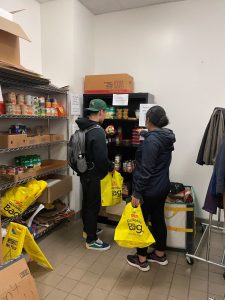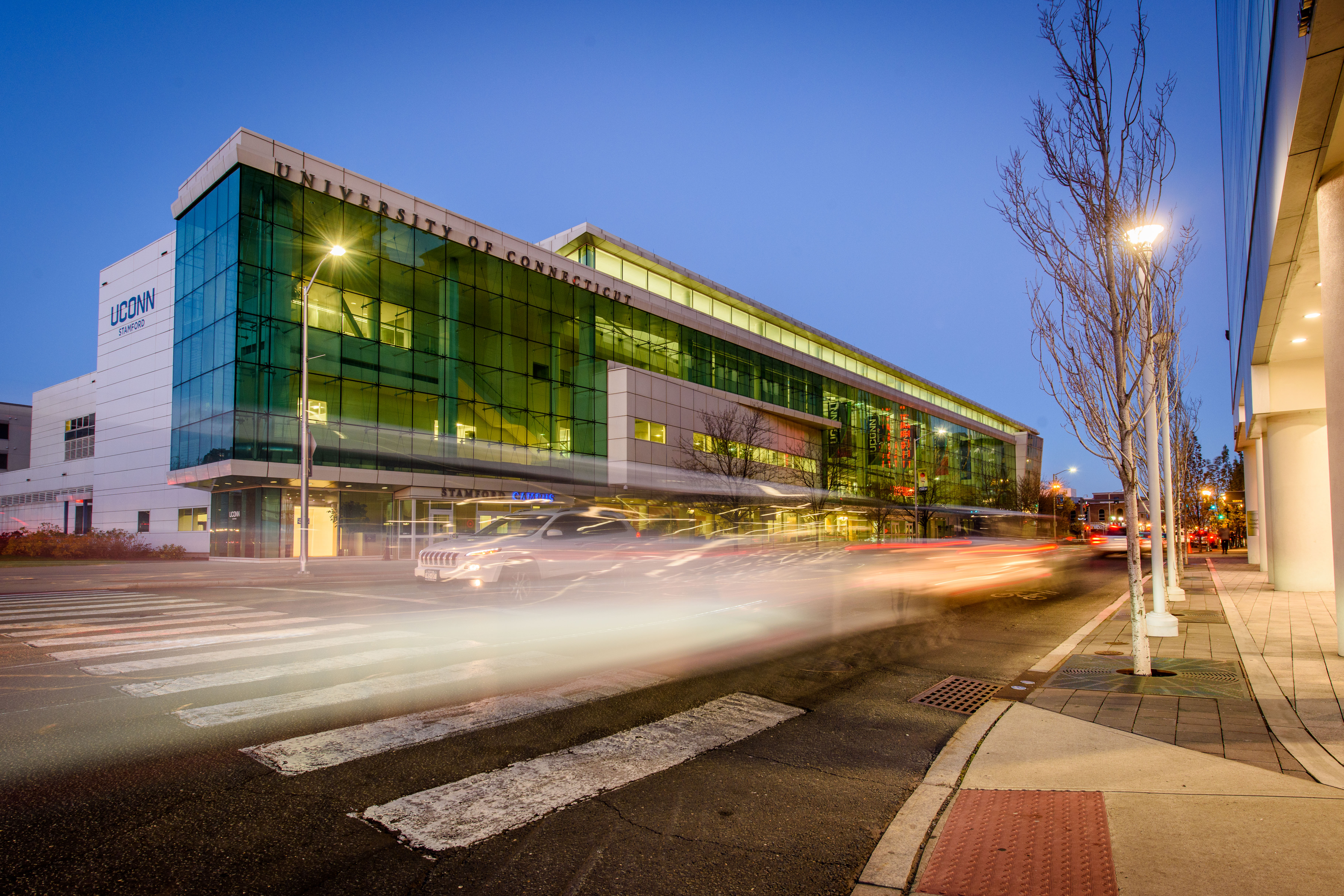When Katharine Vartuli ’23 (CLAS) goes shopping she’ll often come out with 25 boxes of cereal and 40 boxes of pasta, enough rations to last a week and feed up to 150 people.
Her mission every Monday at the Food Bank of Lower Fairfield County Inc. is to make her budget go as far as possible for the benefit of the pop-up food pantry she and three dozen classmates are helping to run at UConn Stamford this semester.
“This is 100 percent needed,” the communications major from Westport says. “Many students go to school full time, then go to a full-time job just to support themselves and their families. Food insecurity is more prevalent now and it’s growing.”
The pop-up pantry – open Tuesdays, Wednesdays, and Thursdays from 11 a.m. to 2 p.m. – is a hands-on project in associate professor-in-residence Laura Bunyan’s Sociology of Food class that came about at the suggestion of colleagues and after talking with organizers of a pantry at Norwalk Community College.
It operates in a temporary space not far from the UConn Stamford welcome center on the first floor, in a room used by caterers in pre-pandemic times when more events were being held on campus, Bunyan says. With counters, shelving, and refrigeration it’s ideal.
“We are working with the campus to provide a permanent space,” Bunyan says. “My students are broken into groups that focus on different components of the project, and I’m constantly asking them, ‘What happens next? You have to think beyond the semester.’ That’s where they are right now, trying to figure out what’s next.”

Ideally, that would be the hire of a full-time, Stamford-based wellness coordinator who could do the operational work Bunyan has been doing in between teaching classes: shopping for food, fundraising, accepting donations, creating grocery lists, developing policies, arranging for student staffing, updating an Amazon wish list, and more.
“This is beyond my area of expertise,” says Bunyan, who works in the sociology department in the College of Liberal Arts and Sciences.
But for a pop-up project, it’s begun to make a dent in the problem of college food insecurity.
All students can take advantage of the two-snacks-per-day allowance and can take up to five large items, like boxes of cereal and shelf-stable milk, per week, Bunyan says. She tries to stock the pantry with things like bananas and apples, granola bars, string cheese, yogurt, and ramen noodle cups for snack foods to give students a quick bite between classes.
Food Rescue US, a nonprofit that works with businesses to collect unsold or unused food that’s likely to be discarded, connected the pantry with Cobs Bread in Stamford, which donates its extra baked goods to charities. Along with Cobs focaccia, rolls, and pastries, the pantry also has benefitted from the reduced prices at the Food Bank of Lower Fairfield County, along with donations dropped in collection bins on campus and what faculty, staff, and external donors have offered.
By allowing all students to visit, Bunyan says the goal is to reduce the stigma of food insecurity because friends can stop in together, encouraging more to take advantage without having to disclose private information. And each day it’s open, the pantry has been drawing an average of 50 students over the three hours.
Last fall, Bunyan says she had one student who had to return a rented textbook before the end of the semester because they couldn’t afford to keep it any longer: “Keep in mind, these books are about $20 online. This is a big problem that we’ve long known. If you don’t have $20 for a textbook, you don’t have money to buy food.”
Another student, someone Bunyan says she never met, emailed at the start of this semester asking when the pantry would open. She replied that it hadn’t yet but offered what items she had available if the need was urgent. After the opening, Bunyan says she reached out and the student is reciprocating by volunteering.
“Professors are seeing more students coming to college with more needs and the challenge is helping them be successful while they’re at UConn and beyond,” Bunyan says, noting over the years she’s bought lunch for students, offered granola bars, even once made a lasagna. “But you can’t do that with them all. There are too many. One lasagna is not going to cut it.”
And one semester – the pantry will close at the end of the month but may open during exam week – isn’t going to solve the problem, but it does help and has inspired.
“I will continue to volunteer after this semester because I don’t want to let it go,” says Vartuli, who just picked a sociology minor based on the experience in Bunyan’s class. “I honestly didn’t think I would be this involved. I thought I’d take the class as another requirement and stay in the background. But then the more I volunteered, I was so surprised by how much I loved it. I didn’t think a course on food would be this interesting. We dig deep into the different economic, political, and social factors of food.”
Visit the UConn Stamford food pantry website for details on how to make monetary donations and how to purchase from its Amazon wish list. Items purchased on Amazon are delivered directly to the food pantry.



